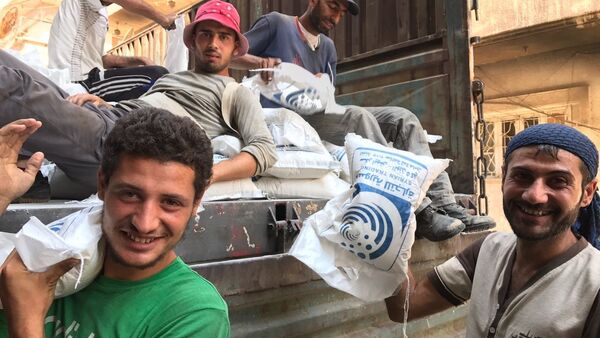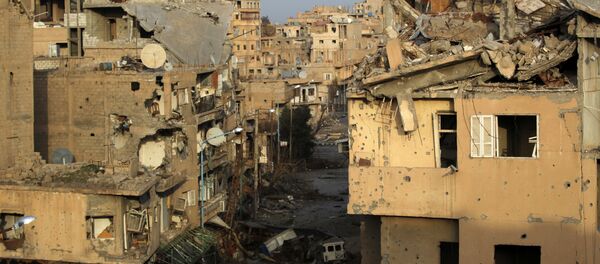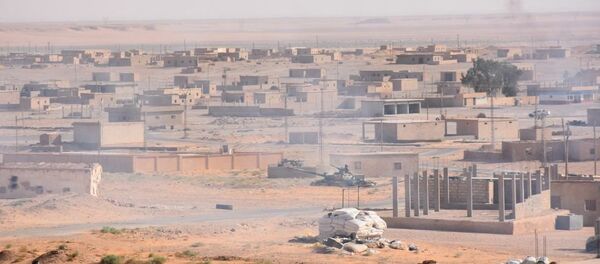DEIR EZ-ZOR (Syria) (Sputnik) — The three-year long siege of Syrian eastern city of Deir ez-Zor was lifted ten days ago, and a RIA Novosti correspondent has talked to city residents and learned what it felt like being besieged by terrorists for over 36 months.
On September 5, the Syrian Army lifted the city’s 36-month-plus siege by the Islamic State (Daesh) terrorist group. Nowadays, one can notice more and more smiling faces on the local streets, and the marketplace is being filled with all sorts of goods. Before that, the Government of Syria and the Russian Defense Ministry airlifted humanitarian aid to the city’s affected population. The International Federation of Red Cross and Red Crescent Societies are also currently involved in this process.
WATER FROM THE EUPHRATES RIVER
The heat wave does not prevent seasoned city residents from walking around the marketplace and choosing various foods. Today, you can hear vendors shouting “Cold juice!” and “Cold water!” every ten steps you take. The word “cold” is acquiring a magic meaning in a 122-degree heat. Boiled and chlorinated water from the Euphrates River tasting like slime was considered fit for drinking only a short while ago.
“This water also comes from the Euphrates River, but we are now able to filter it. The symbolic non-profit price allows our fellow city residents to drink tasty cold water at long last. Today, it is already possible to buy bottled water that costs 125 pounds (about $0.3 for 1.5 liters) or just like in Damascus. But long lines are standing at state-owned warehouses,” a salesperson of a local store noted.
Deir ez-Zor residents had to do without electricity and other benefits of civilization for three and a half years. Diesel fuel tankers arrived in the city several days ago, and old diesel generators were set off rattling on every street. The military forced terrorists away from the city’s power station a few days ago. Local authorities believe that it will take a few months to rebuild the station that was partly blown up by retreating terrorists who also stole some of its equipment.
As per instructions from Syrian leaders, the first truck convoy was sent to Deir ez-Zor on the third day after lifting the siege. Several convoys arriving in the city every day deliver fruits, vegetables, medications and household chemicals. Any city resident can buy all the essentials for state-regulated prices.
AIRLIFTING AID
Improvised tearooms have already opened at the marketplace, with respected local elders discussing the latest events at the front and all over the world, while savoring sweet tea that has been boiled on coals.
“Do you remember Salma from the main street? She was left with two girls after they evacuated her wounded husband to Damascus. We should drop by and find out whether her boys have arrived or not,” an old man wearing a white Keffiyeh headdress on his head told his friend, while inhaling the dense smoke of a home-made filter-less cigarette.
While listening to their slow conversation, we learned that Salma, who was left without her husband and son, lost all sources of income and was unable to find a job in the embattled city. Neighbors helped her and the two little girls to survive, sharing their water and bread, if any. Local authorities also provided her with some food after planes started dropping containers on daily resupply missions.
A Russian cargo plane dropped the first few metric tons of food over the city. The UN also started using this method, with Deir ez-Zor residents receiving 309 batches of UN humanitarian relief aid during the entire siege.
These containers slung under parachutes and drifting slowly to the ground saved many people, including Salma and her daughters, from certain death.
“EDIBLE” LEAVES AND PRECIOUS BIRDS
Today, one can see hundreds of joyful people with food packages on the city’s streets. It appears that they have not yet completely comprehended their freedom, and that they are afraid that their current “paradise” might end.
“Are you Russians? Thank you for coming to our rescue. There were many Russians here before the war. Our men, who studied in Russia, came back with beautiful Russian women. But none of them are here today, and all Christians have also left for fear of Daesh reprisals,” a local woman told us after learning that we were foreigners.
“When was the last time you ate meat? My son was able to buy one kilogram of veal today, and I am inviting you to share our festive dinner today,” the woman went on to say.
After convincing her that we had eaten meat quite recently, rather than three years ago like her family with many children, we helped the woman carry the bags to her home.
A large red rooster running around under our feet like a house cat attracted our attention.
“This heroic rooster has saved us,” the man said petting the bird. “In late 2015, people found themselves on the verge of despair, with many of them eating tree bark and drinking any liquid that resembled water. My family was no exception either, but this rooster saved us. In the past few months, we and our neighbors’ family ate eggs that saved our children from certain death.”
Abu Hassan recalls that some people offered several hundred US dollars for a chicken, and the rooster cost even more than one sheep worth at least $500 at the local marketplace.
“We realized that the loss of any bird, especially the rooster, might cost our family and that of the neighbors’ family their lives; therefore we protected the red rooster and always found food for him and his ‘harem,’” the man said laughing.
Over 80,000 people lived in Deir ez-Zor during the siege. Every true story combines despair with hope and fortitude. Quite possibly, it was precisely these traits that helped local residents to defend their home city from terrorists, who came from the desert.







